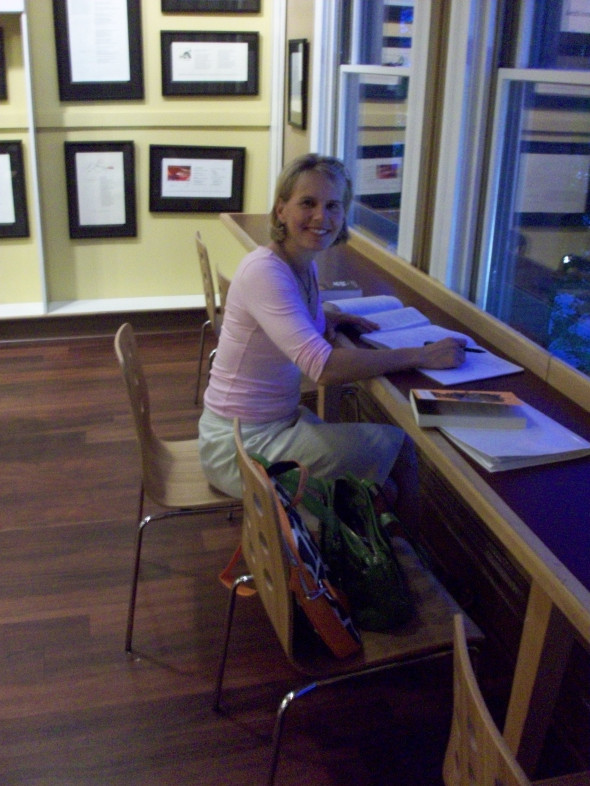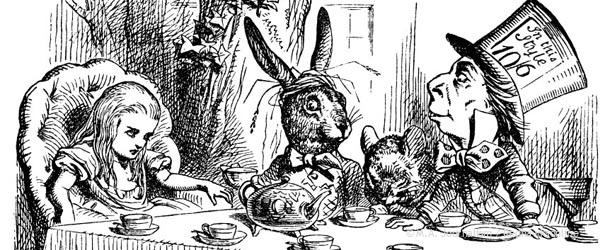Sharing human experience
Storytelling is an age-old tradition that teaches all of us about ourselves and one another through the mixture of imagination and relatability
After attending a writers’ workshop at the University of Iowa in 2011, English teacher Katherine Myers was convinced by a friend to participate in a reading. Myers walked through the front of a small jewelry store to reach the makeshift stage in the back. As Myers waited for her turn to speak, she began to worry that the story she had to tell wasn’t the story the audience wanted to hear.
“Morose, dark poems and stories” had filled the ears of the listeners as Myers waited for her turn, slot 14, to come along. Disregarding her worries, she made her way to the stage to tell the humorous anecdote she had created.

Myers sits at a coffee shop working on an assignment for the writers’ workshop. Photo courtesy of Katherine Myers.
The response was better than she could have hoped, even to the point that she had to wait for the laughter to subside before she could continue reading. And after the piece, wholehearted applause erased her former fears. Even greater, the following day an audience member met Myers on the street to tell her how much they had loved her story.
Making a connection
Even before the invention of writing, storytelling has been a significant part of human culture. Whether it’s fiction or nonfiction, oral tradition or movies, stories are an ever-present facet of our lives. But what makes storytelling more important? Why does our society so consistently make use of narratives, both fiction and nonfiction? For Myers, sharing her story proved to be a way of relating to her audience.
“It was just so amazing to me that [my story] had connected to that audience,” said Myers. “There was laughter and there was a recognition of the event. It’s all a way of sharing our human experience. In my case, it was a chance to connect with people through laughter and humbling ourselves enough to make fun of and celebrate who we are.”
Beyond laughter, the stories we read of those we know can help us learn about ourselves.
“We’re always looking for how we better ourselves, how we fit in the world,” said Myers. “I think for everybody, there’s a question of ‘who am I?’, ‘what am I called to do?’ and ‘how can I achieve that?’ It feeds that inherent question by seeing someone we’re related to. It’s maybe helping us see more of our own self, more of who we might become. I think we are creative, intelligent, compassionate beings and storytelling feeds our creativity,” said Myers. “It increases our intelligence and it connects us to one another, feeding that relational part of ourselves.”
Normandale professor of anthropology Stephen Wiley also believes in the creative value of storytelling and the connection it fosters between people.
“I think that creative imagining is absolutely critical to being human,” said Wiley. “More people would probably be capable of doing it and entertaining and enriching the lives of the people they know if they tried it.”
Drawing from the past
Sometimes, storytellers rework material from the past. A person doesn’t have to be Shakespeare to make an impression.
“A good story will be able to withstand tinkering with because the bones of it are really solid,” said Wiley. “They speak to us in ways we understand, in ways that maybe we don’t understand, but in ways that pull us in whether we want to be pulled in or not.”
The core values that stories hold are crucial to their importance.
“You can tell a love story a million ways, but the point of it will always be the love,” said junior Annie Warnke. “I love story telling. I don’t think my life could exist without story telling, and I don’t know if anyone else’s life could necessarily exist without story telling. Story telling happens day-to-day. I just think story telling can be such a great bridge between people and cultures.”
Peering inside the box
Warnke’s experience with stories has been a defining aspect of her life and in the way she thinks.
“[Stories have] really shaped my life,” said Warnke. “I’ve been involved in theatre since sixth grade and I’ve watched anime since sixth grade and those have some really in-depth story telling. I think it just enables me with a different way to think because I get to analyze these overarching plots that can take anywhere from 50 to a hundred episodes. It just gives your brain a chance to think and you get to imagine how the characters think. It’s like a box that you can open the cover and peer inside, or you can reach in and discover what’s inside.”
Becoming involved with a story and the plight of the characters is a primary benefit of experiencing stories, according to film and theatre teacher Nicholas Freeman.
“Even if that story is fluff or a lighthearted story, it’s still important for us to immerse ourselves in a world that is different from our own to get a sense of what others are going through,” said Freeman.
To the school and to the students in it, Freeman offers a challenge.
“It’s important that we as a school invest in making sure that our brains are working outside of the box, and in order to do that we have to flex our imagination muscles,” said Freeman. “We have to make sure that everyone’s thoughts and stories, fictitious or not, are being told. [We have] to understand that we all have a voice. Whether we’re great filmmakers or great theatre people or great authors or not doesn’t really matter as long as we’re investing in that in our own minds. To make sure that morals are talked about or situations come up that people can relate to. We’re not in this journey alone. We can share our stories and learn from one another.”

